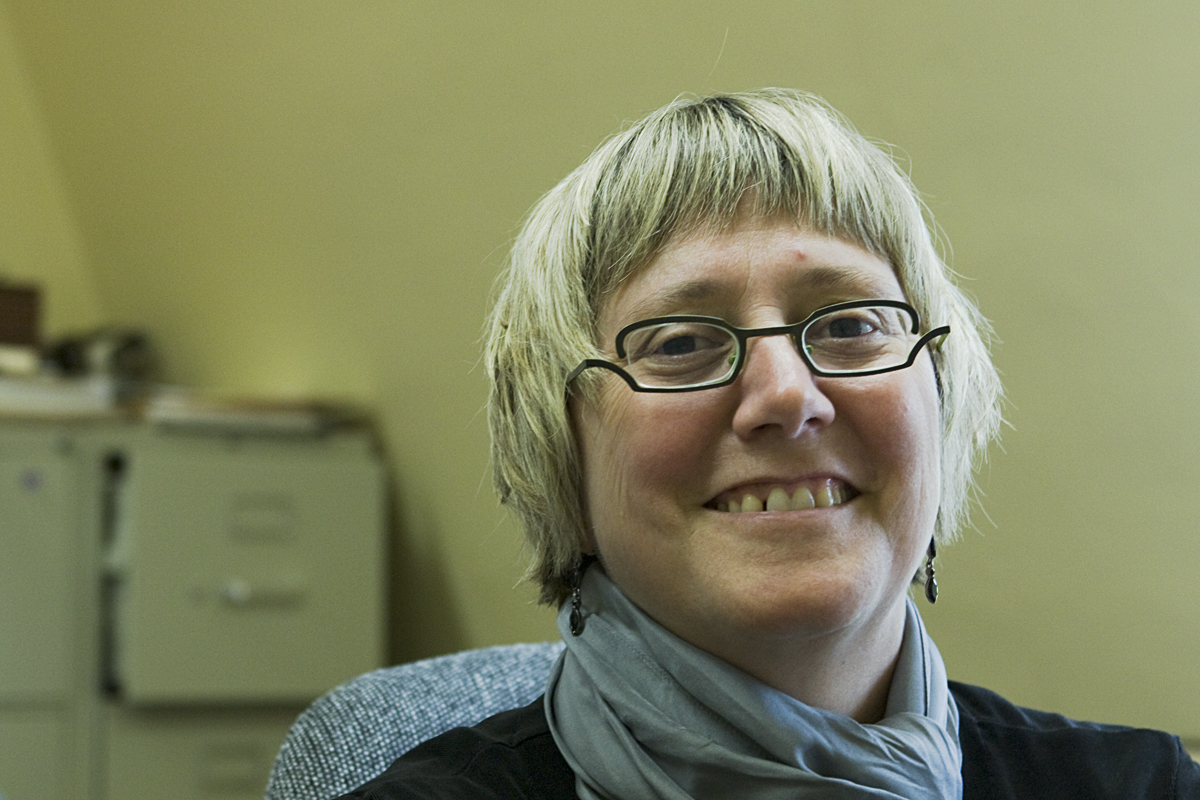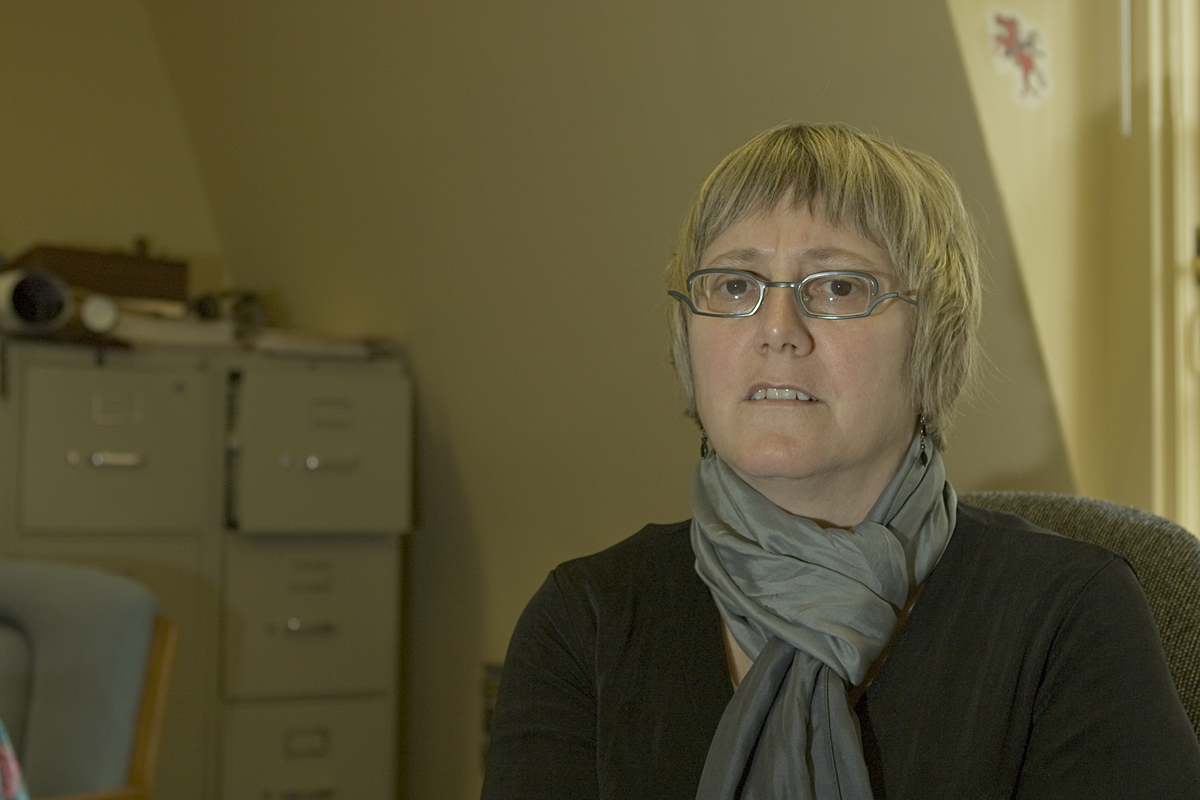Interview by Leah Kennedy
Photos by Blake Hamilton
Universities around the globe have hosted the Console-ing Passions Conference, which discusses media in relation to feminism and gender issues. This year, thanks to the work of University of Oregon Professor Carol Stabile and Assistant Professor Priscilla Ovalle, the conference is traveling to Eugene from April 22-24. Attendants, be they undergrads or faculty, will have the opportunity to attend panels ranging from the Twilight series to science fiction and gender.
Leah Kennedy: I know that Console-ing Passions is not a member organization, but is rather operated by board members. How does this work and are you both members?
Carol Stabile: I am on the board and Priscilla will be on the board [this year]. When Console-ing Passions was founded they really wanted to establish a community of feminist scholars and be able to appoint and mentor new members. There are 15 members and we are bringing on four new members this year.
LK: Is Console-ing Passions associated with any major media entities?
CS: Some media entities have come to the conference in the past. Two years ago there were a bunch of writers from the now sadly departed [TV show] “Terminator: The Sara Connor Chronicles” who came and spoke, but in terms of large media corporations, they probably would not be our best friends.
Priscilla Ovalle: Yes, it’s a bit more of a rebellious and rambunctious group that comes to Console-ing Passions.
CS: We love media and we consume a great deal of media, but the kinds of things we write about are not part of the mainstream media, but we do have [Portland-based] Bitch Magazine coming this year.
LK: Why was the University of Oregon chosen as the host campus this year? What is the process of selecting a host campus?
CS: They chose us because of me. I’m on the board and there was talk about having it in two other places. Both of them were hit hard by the recession, and I had resources and the U.O. contributed resources and so we decided to bring the conference here.
PO: There was a lot of campus support for the conference and a lot going on. It just seemed like the right time and the right place, thanks to Carol.
LK: How many people will be attending the conference?
CS: I think at last count we had 160 people who had registered and then an additional 50 who may register on site. It usually runs about that size or slightly smaller. With the recession, I feel that this is a strong showing. We have about 20 to 25 U.O. undergrads registered.
LK: How is the conference funded?
CS: The money people pay to register goes to funding it. That’s the other thing about not having a member organization. When you have a member organization, people pay dues, and because this is like a one shot deal, our costs for registration are usually higher. What Priscilla and I did this year was we applied for a College of Arts and Sciences Program Grant (C.A.S.), and that let us reduce the price dramatically for graduate students.
LK: How much of the costs are the host university’s responsibility?
CS: Board member organizations also contribute often, depending on their funding situation. So we had contributions from University of California – Santa Barbara, Tulane University, University of Wisconsin – Milwaukee, and a couple of others. In exchange, they get free registration for themselves and a graduate student.
LK: How are the topics for the panels at the conference chosen?
PO: It’s very different from most conferences [where there’s] a sort of theme and you have to write to that theme or there are panels being organized and you can submit to those kinds of panels. But this one is very different in that it is whatever you feel needs to be written at that time can be submitted. Basically the shape of the conference has been built by what the people attending the conference are thinking about and wanting to discuss, which is really nice because it makes it very contemporary and very live and very pertinent. It’s user generated.
LK: Why is it important that the conference considers gender studies in relation to media?
PO: Console-ing Passions was originally generated as the result of this desire to talk very directly about the intersection between those two issues, so it’s always been at the forefront of Console-ing Passions as an entity. [With] each iteration of [the conference] it’s the responsibility of the board and the organizers that this topic is really central to whatever develops at the conference.
CS: And selfishly, there are so few spaces that are feminist, and I think one of the things that people really value is being able to come to this conference and have conversations with people in these fields about gender. People who are knowledgeable, people who are invested in it, people who are committed to feminist theory. They don’t get to have those conversations anywhere else.
There are things you can assume when you present your paper here. You aren’t going to have to deal with people who are going to object to the emphasis on gender or people who are going to object to thinking about intersections of race and sexuality and gender. Those things are a given.
LK: What impact do you think this conference will have on the University of Oregon or on any U.O. students who are attending?
CS: I think this will bring a really diverse group of feminists to campus and that’s always good, and I think having these conversations about gender and race and sexuality is also good. It seems to me that the campus could use more of those discussions.
PO: I think there’s something about media studies that can sometimes be a lot more tangible for a larger percentage of the population because we are all media consumers in one way or another. I think having a conference like this, especially in light of Cinema Studies [a new major program] being in development and the fact that our journalism [department] is now strengthened with Television Studies and with Professor Stabile’s arrival two years ago, I think this is just a good time for us to all be able to talk about and commune around this idea of media and gender studies. I think its just good timing for it and to get a sense of who is here and who is interested in these kinds of things.
LK: What role will men play at the Console-ing Passions Conference?
CS: There are lots of guys. There are guys chairing panels, volunteering at the conference. We have two awesome guys without whom we couldn’t have the done the work that we did: Stephen Rust and Drew Beard, who are graduate students in the English Department. They have done so much work and have helped so much.
LK: What is one thing you would like students who are considering attending the conference to know before they register?
CS: It is a feminist conference and that’s the space. We love discussion. There is great discussion that goes on at Console-ing Passions, but we assume that people are going to be okay with feminist theory and feminist ideas.
PO: I would like them to know it is an opportunity to be a part of the next wave of research. If there is any kind of interest in what is going on now and the foreseeable future, this is a great opportunity to see it at the ground level. There are a lot of things that come out of this conference that are at the polishing phases, but there is other stuff that is very, very new. It’s just an exciting opportunity to see something new and fresh.
The 2010 Console-ing Passions conference runs April 22 – April 24. For more information or to register, visit http://cptv.uoregon.edu









